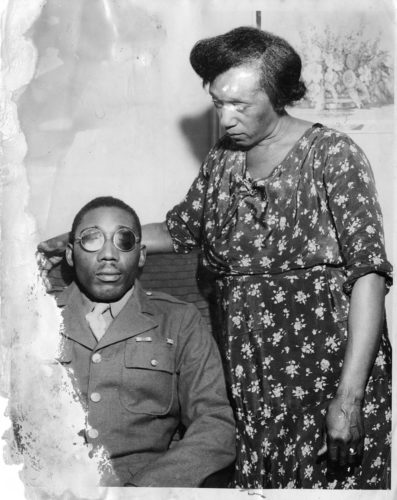Why a Town Is Finally Honoring a Black Veteran Attacked by Its Police Chief
Share
Explore Our Galleries
Breaking News!
Today's news and culture by Black and other reporters in the Black and mainstream media.
Ways to Support ABHM?
By Audra D.S. Burch

Sgt. Isaac Woodard Jr., who was blinded during a brutal beating by the police in South Carolina, with his mother in 1946. Credit – Special Collections and Archives/Georgia State University Library
It was a racial assault so vicious that it became one of the early chords of the civil rights movement, and led to the desegregation of the military.
Sgt. Isaac Woodard Jr., 26, was a decorated African-American veteran. He had just been honorably discharged from the United States Army in 1946 and was headed home to Winnsboro, S.C. Still in uniform, Mr. Woodard, was forcibly removed from the bus, brutally beaten and jailed by the white police chief in the town of Batesburg.
But in the small town where Mr. Woodard was beaten so severely that he lost his sight, the crime went unpunished and largely faded from memory. Almost three generations later, a black Army veteran in Georgia and a white federal judge in South Carolina separately stumbled upon Mr. Woodard’s story and vowed to honor his memory….
“Here is this hero that so many people have forgotten or didn’t know about,” said Don North, a former Army major from Carrollton, Ga., who spent three years researching and raising money for the marker. “This is about remembering him, what he endured and the legacy he left behind….”
“There were multiple episodes of black veterans abused across the South,” said Judge Richard Gergel, the federal judge who began researching Mr. Woodard’s history in 2011. “They were serving their country, fighting for American liberty and freedom and not given liberty and freedom when they came back home….”
Robert Young, 81, Mr. Woodard’s nephew and main caretaker, said that for some time his uncle was understandably bitter about what had happened. “But at some point, he just tried to live his life,” he said. “I still have this wonderful memory of him coming home for a break before he went overseas. He was standing in the kitchen in his Army uniform and my mom and sister were so excited to see him. He had made us proud.”
On Saturday, a group of town leaders, African-American and disabled veterans as well as Mr. Young and Mr. Gergel, who are meeting in person for the first time, will walk the two blocks through downtown and past the remnants of what Mr. Woodard likely last saw before being robbed of his eyesight: the railroad station, a drugstore, a hardware store.
Read the full article here
Read more Breaking News here
View more galleries from ABHM here









Comments Are Welcome
Note: We moderate submissions in order to create a space for meaningful dialogue, a space where museum visitors – adults and youth –– can exchange informed, thoughtful, and relevant comments that add value to our exhibits.
Racial slurs, personal attacks, obscenity, profanity, and SHOUTING do not meet the above standard. Such comments are posted in the exhibit Hateful Speech. Commercial promotions, impersonations, and incoherent comments likewise fail to meet our goals, so will not be posted. Submissions longer than 120 words will be shortened.
See our full Comments Policy here.